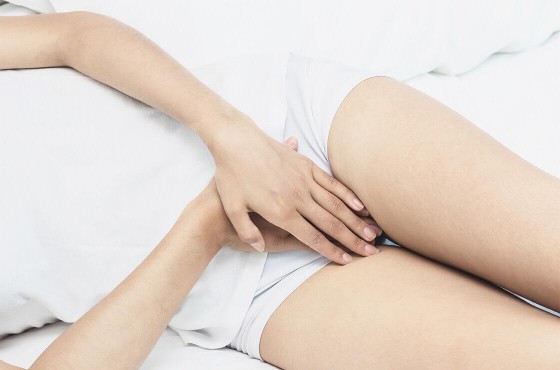Vaginal thrush:
explanations and solutions
Written by Paul Musset, Doctor in Pharmacy | published on | updated on 15/04/2024

Three out of four women suffer from vaginal thrush at some point in their lives. This pathology, which is both physically and psychologically uncomfortable, is most often benign. However, the pain and itching it causes can make life impossible for the person suffering from it. How does vaginal thrush occur? How can it be prevented? Let’s shine a light on this itchy and irritating genital infection.
Vaginal or vulvar thrush: How can it be recognised?
What is it?
Vaginal thrush is a benign genital infection caused by a proliferation of a fungus called Candida albicans in the vaginal flora. This yeast is naturally present in the human body at the mucous membranes. Harmless in low concentrations, it is essential for the proper functioning of the body.
However, for various reasons which we will discuss later, these micro-organisms may multiply and cause an infection, such as a vaginal or vulvar thrush.
Vaginal or vulvar thrush: What’s the difference?
These two types of infection belong to the same family of genital thrush. As the name suggests, one affects the vulva – the external genitals of the female (labia minora, labia majora, vestibule and clitoris) – while the other infection targets the vagina.
In the majority of cases, thrush affects both the vagina and the vulva.
The symptoms
A woman affected by vulvar or vaginal thrush will mainly feel the following symptoms:
- Itching in the vagina and vulva
- Abundant and thick discharge
These symptoms are often accompanied by:
- Pain during sexual intercourse
- A burning sensation in the vagina when urinating
Why and when does vaginal thrush occur?
Destabilised flora
The vagina is home to bacteria called lactobacilli. These bacteria coexist with a yeast called Candida albicans. Together, they make up the vaginal flora. The role of the lactobacilli is to prevent the adhesion of Candida albicans yeast to the vaginal walls. When a small quantity of this yeast is present, everything goes well.
However, when the quantity of yeast multiplies, this balance is disrupted and the flora is destabilised. It is this state that is responsible for vaginal thrush.
Pregnant women at higher risk
One of the main causes of vaginal thrush is linked to a sudden hormonal change that disrupts the balance of the flora. Pregnant women are therefore potentially at higher risk of developing vaginal thrush. Indeed, the increase in hormones during pregnancy modifies the vaginal wall, decreasing local immunity.
Antibiotics: Often a culprit
The second risk factor is antibiotic use. By destroying germs, antibiotics also attack the vaginal flora, causing it to become unbalanced.
Bad habits
Other lifestyle factors can cause vaginal and vulvar thrush:
Too frequent and inappropriate intimate hygiene
Concerned about their intimate hygiene, many women automatically use wipes too regularly. If used too often, wipes can irritate the mucous membranes and promote the development of thrush.
Soap is also a risk factor, as it can alter the vaginal flora. To avoid risks, it is essential to use a product with a pH close to the physiological pH (between 4.5 and 9). Finally, vaginal douching can also cause local infections, as it eliminates the lactobacilli.
Close-fitting clothing or inadequate underwear
In either case, these are irritation risks that can lead to genital or vulvar thrush.
No more preconceived notions!
Many people think that vaginal thrush is synonymous with poor hygiene. In fact, it is often excessive intimate hygiene that causes the infection.
Vaginal or vulvar thrush: Treatment and prevention
Types of treatment
Available in pharmacies: Vaginal ovules
It is quite possible to treat an uncomplicated and clearly identified case of thrush without consulting a doctor.
To treat genital thrush, a pharmacist may prescribe:
- Ovules to be inserted into the vagina that will get rid of the yeast causing the infection. There are two types of ovules:
- A cream to be applied to the vulva to restore the flora
If symptoms persist after three days, it is advisable to consult a doctor.
Medical treatments: Antifungal medicine
In the event of recurrent thrush or if a simple treatment is unable to get rid of your vaginal thrush, your doctor may prescribe an antifungal medicine. This medicine may be in the form of tablets, capsules or gels to be taken orally. This type of treatment is available only on prescription.
It is possible to prevent uncomplicated vaginal or vulvar thrush!
Gel or cream to rebalance the flora
In order to protect from thrush, it is possible to help maintain the balance of the vaginal flora by ensuring the mucous membranes remain adequately hydrated. The use of an ointment such as Saugella Douceur cream can really help. Its composition based on Calendula extracts and its neutral pH soothe and ease weakened or irritated mucous membranes.
Probiotic capsules
Probiotics are a good way to prevent vaginal and vulvar thrush, as they help rebalance the flora. Hydralin Flora comes in the form of capsules to be inserted into the vagina in the evening at bedtime. They contain a probiotic strain that will prevent the proliferation of pathogenic micro-organisms.
Thrush: Protect yourself
When taking antibiotics, apply a local probiotic-based treatment to help prevent the development of vaginal thrush. The vaginal flora is very fragile and the slightest imbalance can cause an infection. When at higher risk, such as being pregnant or taking antibiotics, it can be very useful to anticipate the occurrence of thrush by taking preventive measures.
All women can potentially be affected at some point in their lives by vaginal or vulvar thrush. Even if this pathology is benign, the associated symptoms are often very uncomfortable, both physically and psychologically. Good hygiene practices may be all it takes to avoid finding yourself in this unpleasant situation.
Three key points to remember about vaginal thrush:
- Excessive intimate hygiene can lead to vaginal thrush.
- To avoid a recurrence, care must be taken to rebalance the vaginal flora.
- If symptoms persist or if the pain is severe, it is necessary to consult a doctor.




















